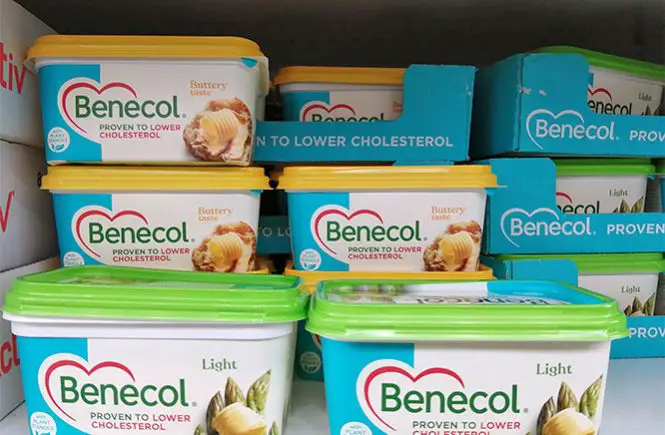Benecol spread is a butter alternative that contains plant stanols and is promoted as a method to reduce cholesterol. While mimicking the appearance and taste of conventional butter or margarine, it provides extra health perks.
In this article, we’ll dive into understanding if Benecol Spread is truly beneficial by breaking down its composition, nutrition facts, health advantages, and possible concerns.
Benecol Spreads Overview
- Ingredients in Benecol Spread
- Nutritional Details
- Health Advantages of Using Benecol
- Comparing Benecol to Regular Butter
- Effectiveness of Benecol in Reducing Cholesterol
- Concerns with Benecol
- How to Integrate Benecol into Your Meals
- The Final Take: Is Benecol a Healthy Choice?
Ingredients in Benecol Spread
Benecol offers different spread variations, with the Buttery Spread being the most favored. Here’s a glimpse of its ingredients:
- Rapeseed Oil: Extracted from the rapeseed plant
- Water: Forms the spread’s base
- Plant Stanol Ester: These are natural compounds found in many plant sources. Their addition boosts cholesterol-lowering effects in the product without impacting its taste or consistency.
- Ethically Obtained Palm Oil
- Dry Buttermilk: Adds creaminess and flavor
- Salt (1%): For taste enhancement
- Emulsifiers (like Mono and Diglycerides of Fatty Acids, Sunflower Lecithin)
- Natural Flavor Enhancers
- Citric Acid: Maintains proper acidity
- Carotenes: Imparts the yellow hue
- Added Vitamins A and D3
The pivotal active component is plant stanols, which impart the cholesterol-reducing property.
The Light version has nearly the same ingredients but excludes buttermilk, substituting it with whey powder and modified starch for lesser fat content.
Benecol Olive Oil Spread consists of 11% olive oil among other standard ingredients.
Nutritional Breakdown
Each 10g serving of Benecol Buttery Spread has 54 calories and contains 5.9g of fats, of which 1.1g is saturated. A serving gives 0.7g of plant stanols, and to maximize its effectiveness, consuming three servings daily is ideal.
It’s enriched with Vitamins A and D3, crucial for vision, bone health, and immune functions. Moreover, it’s a source of heart-healthy omega-3 fatty acids.
Health Perks of Benecol Spread
Benecol’s primary advantage is its capability to diminish cholesterol levels. Consuming 2-3 grams of plant stanols daily can potentially decrease LDL or “bad” cholesterol by about 10%.
Apart from that, the omega-3 fatty acids in the spread offer inflammation-reducing benefits, which are also good for cardiac health. This spread also stands out as a low-calorie and vitamin-enriched alternative to typical spreads.
Benecol vs. Butter
When it comes to nutrition, traditional butter, derived from dairy, has roughly 100 calories and 11 grams of total fat per tablespoon. In contrast, a tablespoon of Benecol spread has around 50 calories and 5.4 grams of fats.
Benecol’s edge lies in its superior cholesterol-reducing attribute. On the other hand, butter can elevate cholesterol levels when consumed excessively, which is not advised for those with heart issues or high cholesterol.
Cholesterol-Reducing Efficiency of Benecol
Research indicates that plant sterol-enriched products, including Benecol, can cut down LDL cholesterol by roughly 10%. However, their effectiveness varies based on factors like an individual’s initial LDL levels and consumption pattern.
It’s crucial to strike a balance in consumption and pair it with a healthy diet for maximum benefits.
Potential Benecol Concerns
While Benecol offers advantages, potential users should be aware of certain drawbacks:
- Some might experience digestive issues when consuming large amounts of plant sterols.
- It’s not recommended for people with the rare genetic disorder called sitosterolemia.
- Remember, Benecol is an addition, not a replacement, to a balanced diet and active lifestyle.
Consultation with a healthcare expert is advised before integrating Benecol into your dietary regimen.
Incorporating Benecol in Your Meals
Using Benecol as a replacement for regular butter on bread or for culinary purposes can be beneficial. However, consult with a healthcare provider for personalized advice.
Final Takeaway
Scientific data backs the effectiveness of Benecol in reducing cholesterol when consumed as part of a balanced diet. However, it’s vital to ensure you’re consuming the correct quantity and to consult a medical professional before making dietary shifts. If your goal is to manage cholesterol, Benecol can be a valuable addition to your dietary choices.

